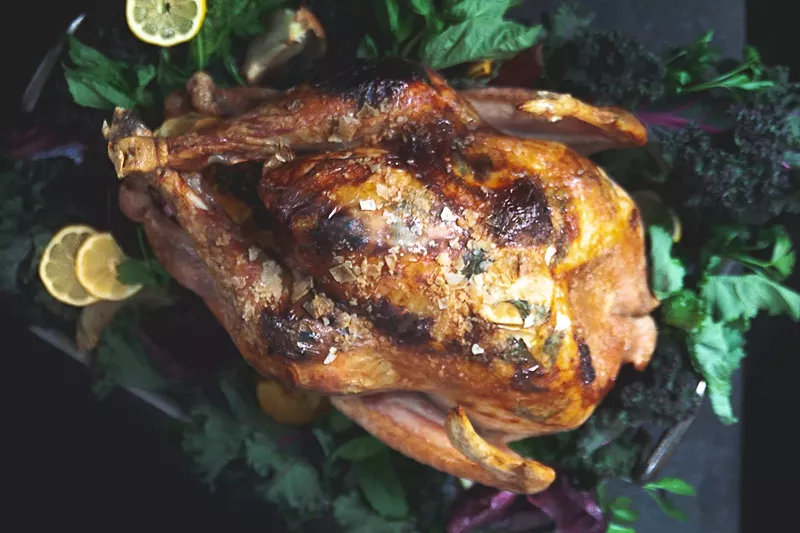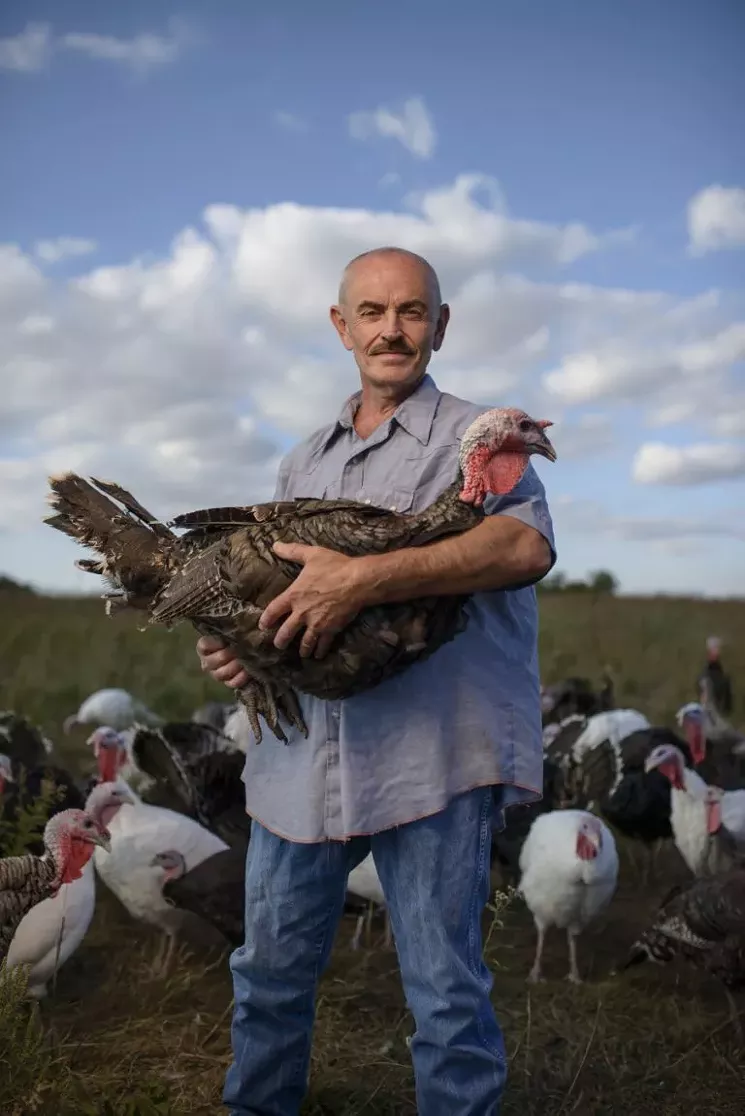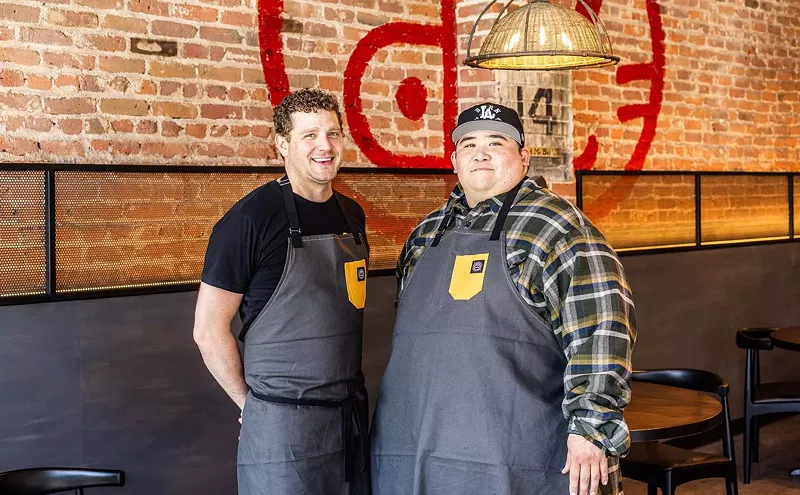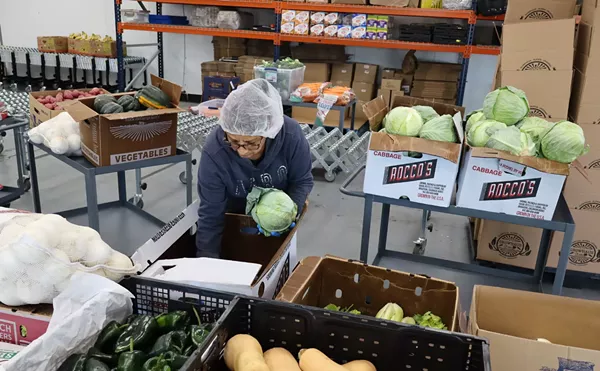How, you may ask, can they get away with charging so much for turkey? A better question might be why conventional turkey is so cheap. The answer is not surprising: When you treat a turkey like an assembly-line commodity, you can keep prices staggeringly low. But Kavanaugh and Curtiss aren't interested in selling turkeys that have been mistreated while alive, processed in industrial slaughterhouses and plumped with fluids before being frozen and shipped around the country.
The majority of meats at Western Daughters come from small family farms within 150 miles of the shop; Good Shepherd, located in rural Kansas, is an exception, in part because Colorado regulations make small-scale poultry farming very difficult, and in part because Frank Reese, owner of Good Shepherd, has an impeccable reputation as an animal-welfare advocate and steward.
"We've been buying his breeding stock for the last four years," Kavanaugh explains. "This will be our fifth Thanksgiving at the shop, and we wanted to go straight to the source this year."
In previous years, Western Daughters has sold birds hatched at Good Shepherd and raised by BN Ranch, but this year the turkeys are coming directly from Reese's farm, where he raises Standard Bronze, White Holland, Black Turkey, Narrangansett, and Bourbon Red breeds. Kavanaugh adds that she's bringing in multiple breeds, though customers won't have the option of selecting the breed, since she won't know the breed of each individual turkey until they arrive (after customers pre-order online).
Conventional turkeys are called "Broad-Breasted Whites" in the industry, but they're not considered a real breed by the American Poultry Association because they can't do the things that come naturally to other turkeys. As part of the APA's heritage breed specifications, Reese's turkeys must meet three standards: The stock must be maintained through natural breeding (conventional turkeys are bred through artificial insemination because they no longer have the ability mate naturally); they must have a long, productive lifespan and be able to withstand living outdoors; and they must have a slow growth rate (28 weeks to maturity, compared to about 16 weeks for conventional turkeys).
We know how we like our turkeys on Thanksgiving, though, so subbing in a heritage breed seems like a risky proposition. But Kavanaugh says you needn't be concerned. "The first time I cooked one, I thought 'What if it's not juicy and there's not enough breast meat, not enough fat?'" she recalls.
"But it is rich, it is unctuous; it's unlike anything else in the turkey world. They were raised outside, foraging in the dirt," so the result of their diet and upbringing is more flavorful meat, she adds.
But cooking a whole turkey is never an easy proposition, and spending a significant amount of money on dinner can add to the anxiety of preparing a big meal for a large group. "Thanksgiving is a really high-stress environment for home cooks," Kavanaugh acknowledges.
So at Western Daughters, she's trying to make the process as pain-free as possible. The store offers turkey brining, spatchcocking, smoking and quartering, and also has recipes, brining kits and tips to help ensure success. Kavanaugh has cooked heritage-breed turkey both brined and un-brined, and says the results are good either way. And with Good Shepherd birds, she points out, cooking is at least twice as fast as with a conventional turkey — about nine to twelve minutes per pound.
The turkeys will be available in sizes ranging from about 8 to 22 pounds, and Kavanaugh says that one pound per person will yield more than enough to eat, though cooks wanting lots of leftovers might need to increase that ratio.
At Christmastime, shoppers seldom balk at similar or higher prices for a beef roast, but we've become accustomed to paying low prices for poultry. Turkey at $13 per pound seems like a luxury item, but Kavanaugh says the system is set up to favor industrial production, so low-income families have few choices when it comes to buying healthy, sustainable meat.
She's working to change that. "For sustainable agriculture to be financially sustainable for everyone — farmers, ranchers, processors, distributors, customers — it must be affordable for everyone as stakeholders," she says. So for the past four years, she's been trying to improve regulations in Colorado.
Right now, options for sending poultry from the farm to the processing center are very limited for small producers, so they must send their birds to the same USDA-inspected plants used by much larger factory farms, but because they can't take advantage of economies of scale, the small farmers often pay as much per bird to have it processed as what you'd pay for a whole chicken or turkey at the grocery store. (So if you think paying $8 to $10 for a four-pound chicken seems reasonable, imagine that a family farmer must pay that cost just to have a single bird processed.)
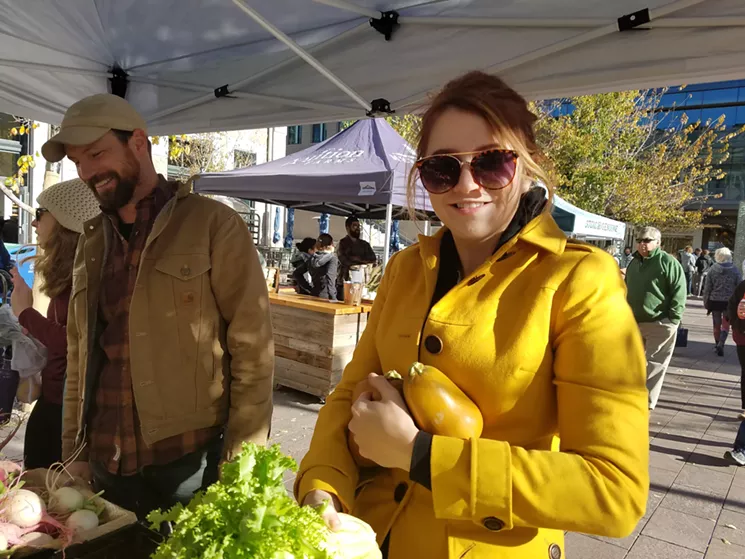
Western Daughters co-owner/butcher Kate Kavanaugh says it's okay to eat more veggies and less turkey for Thanksgiving.
Linnea Covington
So while $13 per pound may not be in the budget for many holiday cooks, Kavanaugh says, "We believe in eating better meat less often," adding that there's always more than enough food on the Thanksgiving table, so a little less turkey and a little more of the other traditional favorites isn't necessarily a bad thing.
Good Shepherd turkeys are now available on the Western Daughters Butcher Shoppe website for pickup fresh (not frozen) the week of Thanksgiving. There is a $75 non-refundable deposit, with the remainder due upon pickup.

